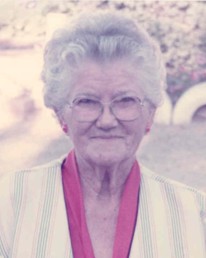
Maria was born in Amorebieta, Bizkaia on 19 March 1898. One of seven children, Maria was raised on the farm that her family had tended since 1690. Her family was quite poor, so at the age of 8 Maria was sent to work for other families. She took care of children and helped with chores for several different families before her father sent her to Bilbao, where she worked and learned how to cook. At the age of 13, after a year in Bilbao, Maria’s father asked her to come home to care for her ailing mother. She did so, and stayed on the family farm until she turned 20.
Maria’s brother, Patxi, urged her to emigrate to the United States to make a better life for herself. After some thought, Maria made the necessary arrangements and took the train to La Havre, France, with her sister, Lorentza. They boarded “La France,” a French steamer, in 1919, and sailed to New York. Maria and her sister bypassed Ellis Island and were taken to the train station, where they boarded the train for Boise, Idaho.
In Boise, Maria worked as a maid and met her husband, Antonio Landa, a sheep herder for Mr. Egurrola. They married in 1922. While he was away with the sheep, Maria stayed in Boise, working and acquainting herself with the Basque community. Maria and her husband farmed for two years before moving to a sheep camp, where Maria cooked for her family and the workers. She raised her children on the sheep camp and the family farm, and enjoyed going with them to help ship the lambs every year. After more than 20 years, Maria and her husband started an orchard and sold peaches, prunes, and apples, which furthered her reputation as an exceptional gardener.
TAPE MINUTE SUMMARY OF CONTENTS
*Note: Mrs. Landa was also interviewed by her son, John Landa. She gives a detailed account of her life story during the interview. A transcript is archived at the Basque Museum and Cultural Center.
0-8:00 Born in Amorebieta. Sailed on “La France” from L’Havre. Parents were farmers. Her 2 brothers were in the US. She came with her sister and with Antoni from “Valencia”. She found people treated each other better here. Father followed her to Durango and asked her to get off the train, because he did not want her to leave. She didn’t want to waste the ticket, so she stayed on the train. Her father kept asking her to get off the train. She didn’t. Today she doesn’t regret it. She went to San Sebastian and then to France to sail to the US.
8:00-13:00 She didn’t know any English but she had money to pay for food during the trip. When she paid for things, she never knew if the change they gave her was correct. She was happy to get some money back. She came to Boise and went to work at Joaquin Solozabal’s boarding house. She met her husband in Boise at a boarding house. He came to the US from Artia in 1912. Even though she did not speak English, she got along by pointing at things. She memorized something that the lady in an American family she worked for told her. She never forgot those words. She went to night school to learn English.
13:00-19:00 She is not a citizen at the time of the interview. The hardest part of adjusting to life in the United States was learning English. She spent 12 years in sheep camps as a cook. She worked for Achabal. They rented a ranch for two years but lost everything. She has been treated very well in the US. Her children went to school, learned English very well, and have not experienced any problems in the US. Her grandmother died in the church in Durango as a result of a bombing, and her mother died in a bombing during the Spanish Civil War. She was hiding in a tunnel for six months in Somorrostro, but was forced to leave the tunnel, which made her vulnerable. As a result, a bomb killed her.
NAMES AND PLACES
NAMES:
Antoni (from the Valencia boarding house): sailed with her.
Joaquin Solozabal: Maria worked for him at his boarding house.
“La France”: name of the ship she sailed on.
“La Touraine”: ship where originally she was going to sail but it was full.
PLACES:
Church of Durango: Her grandmother was in it when it got bombed and she got killed there during the Spanish Civil War.
Somorrostro: During the Spanish Civil War her mother spent 6 months in a tunnel and got killed when they were forced to leave it and bombed.